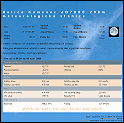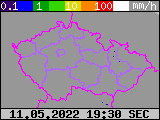|

Vydáno dne 09. 09. 2009 (9544 přečtení) |
|||||||||||||||||||||||||||||||||||||||||||||||||||||||||||||||||||||||||||||||||||||||||||||||||

|
přepnout na verzi v češtině |
I had a dilemma to run the category LP (100 Watts) or QRP (5 Watts). I was very tempted by the QRP, but:
From the time of being a complete beginner I have experience with a CW-1.8Mhz transceiver "Jizera" (Has anybody a photo?). It had a power switch 1/10 Watts, but in the position of 10W it gave out in fact about 3W (at least that piece which I had borrowed from a local radio-club). That time as an antenna I was using a wire about 42 meters long at a height of about 9 meters. Today I am still quite surprised, that it hasn't completely discouraged me from our hobby. Each individual QSO was unimaginable drudgery. I had to repeat everything many times and it often happened that the operator of the other station closed the connection without having taken everything down. I guess I had not matched the antenna very well. So since then I have somewhere in my subconscious mind, that the 160 meter band is not very suitable for QRP.
Nevertheless, I finally decided for the QRP category. Also, I said to myself that it is just hobby, nothing fatally important, so if it goes wrong I can turn it all off and go to sleep.
I used a transceiver, Elecraft K3 set to 5 watts out to an inverted-V dipole antenna with the centre part at a height of about 12 meters. (Some fellows say that it's 15 meters. Actually, I didn't measure it, but I think it doesn't make much of a difference. Anyway, it's very low for the band of 1.8 MHz).
And how did it perform? It was quite a shock for me. During the first several hours of the contest I was only searching and pouncing. The log sometimes showed such a high rate, that I thought there must have been a mistake in the programmed routine. May be not, because it only ever lasted a few minutes. One has to keep in mind, that with the power of five watts output, one is rarely as successful as the first in the queue. There is always someone stronger, so you have to wait.
After the first night I had 266 QSOs. Mostly European stations, but in the morning I hunted down five U.S. stations and one Canadian. It gave me four "North American" multipliers. That encouraged me a lot, so when I went to bed that morning, I knew that I would certainly continue in the evening.
The beginning of the second night wasn't as successful at first. There were only strong European stations, but most of them I had worked with the day before. I overheard a Japanese station, but there was such pile-up around him that I did not even try. I tried to call CQ later, and saw that it worked pretty well. Sometimes several stations called me back at once. Such a little pile-up. I thought that someone had put me into the DX-cluster, but as I learned after the contest, this was not true. (As I found out later, the only one who had spotted my call sign was LY5W early on the Sunday morning. But then I didn't notice any increased interest from other stations). But VE1ZZ shocked me, shortly after midnight, when he replied to my (5Watts!) CQ-ing. He was so strong that the first thing I thought was, that someone was joking. I hope it really was him. (See sample)
I felt that I must have been dreaming on Sunday morning between 6:15 and 6:45 UTC. I was about to turn everything off and go to rest, when several very strong stations from the U.S. appeared suddenly on the band. Surprisingly, there weren't as big pile-ups as I would expect. Indeed, they know very well that we (Europeans) can't transmit under 1810 kHz so they were CQ-ing in the upper part of the band. Most of the European stations were crowded down between 1.810 and 1.850 MHz, because above this there is a restriction of Low Power or even QRP in many European countries. Without any problems I worked with 17 stations in total from the U.S. and Canada. Sometimes it was quite astonishing, how easily they were available. Relatively. One has to keep in mind that I was only using 5 Watts and that mentioned low hanging inverted V. Together with the previous day I had a total of 24 K/VE stations and it brought me 14 "North American" multipliers.
Here are some sound samples:












Please excuse the reduced quality of the recordings. Unfortunately, although I set the proper level of entry into the sound card, I accidentally reversed the line-separating transformer when I connected it all together before the contest. So it transformed the voltage up instead of down. Thus it is overloaded and distorted sometimes. In addition, the compression that is used by the recording program causes a bit of a distortion. (It creates a hissing like tone).
- So in total? 617 QSOs
- 46 countries (multipliers)
- 14 K/VE multipliers
This is a result that I had not even dreamed of. I must say that for me the 160 meters band regained back it's reputation that it lost at the time of my beginnings. It's a bit of a pity that I missed some European multipliers. I heard very well a station from TF (Iceland), but unfortunately I wasn't able to make QSO with him. He just didn't hear me, and as I was listening for a while, mine wasn't the only case. Also a station from 9H (Malta) appeared there, but only for the few last hours of the contest. There was such fuss around him that I did not even try. It took me about 15 minutes until I found out whom all that stations were actually calling. A station from HZ (Saudi Arabia) turned up there at the end of the contest. But the situation was similar with 9H. At one moment I thought I heard 4Z (Israel), but I'm not entirely sure.
Now, some comments about those audio recordings:
In the rules of the contest there is a written notice that it is recommended to record and save an audio file (files) of the whole contest for possible inspection by the committee.Here's the original:
Special request for competitive entries: Wherever possible, the entrant is asked to record and save an audio file of the contest for review by the committee when requested. Any type of audio format is acceptable. This is only a request and is not required for awards.So I decided to record the whole contest. I tried the program by Peter OK1IRG. It is downloadable from the web site OL5Q. It saves separate files after each hour. It performs a real-time compression, so files do not take up too much space on a disk (5.6 MB/hr).
Otherwise I am quite an opponent of audio recordings for the contester's own check after the contest. I think that contests are meant be run in real time. I feel it as cheating if someone checks his logbook for a few weeks after the contest, comparing it with the audio record. Even though it is not banned in the contest rules. It seems to me as if the chess player who lost the game made the analysis, came to where he had made a mistake and then demanded to change the outcome, because NOW he knows how he would have played better.
Jarda, OK1HDU (OK7U in the contest)
Moje účast v CQ WW 160 CW - 2010 (06.02.2010)
Diplom za CQ-WW-160m-DX-CW 2009 (02.11.2009)
CQ-WW-160m-CW QRP (26.01.2009)
| Novinky |
|
07.07.2023: Update na webu DXFC Dneska jsem updatoval info na webu DXFC.
05.07.2019: Update fotoalba Do fotoalba jsem přidal pár fotografií ze:
Slovinska (červen 2019) Fotoalbum prozatím zrušeno. 05.12.2018: Update fotoalba Do fotoalba jsem přidal pár fotografií ze:
Slovinska (jaro 2018) a ze: Suchého Vrchu (zima 2005/2006). Fotogalerie je prozatím zrušena. |
| kalendář |
| |||||||||||||||||||||||||||||||||||||||||||||||||
| Radary ČHMU |
|
|
| Zaparkováno na: |

|
| TSL certifikát: |

|
Tento web site byl vytvořen prostřednictvím phpRS - redakčního systému napsaného v PHP jazyce.
Na této stránce použité názvy programových produktů, firem apod. mohou být ochrannými známkami
nebo registrovanými ochrannými známkami příslušných vlastníků.















